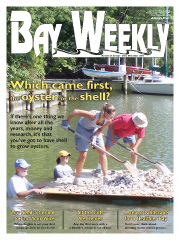Chesapeake Bay's Independent Newspaper ~ Since 1993
1629 Forest Drive, Annapolis, MD 21403 ~ 410-626-9888
Volume xviii, Issue 17 ~ Apri 29 to May 5, 2010
Home \\ Correspondence \\ from the Editor \\ Submit a Letter \\ Classifieds \\ Contact Us
Best of the Bay \\ Dining Guide \\ Home & Garden Guide \\ Archives \\ Distribution \\ Advertising![]()


Bay Gardener |
Manage Your Landscape for a Healthier Bay
Don’t even think of planting warm season grasses
Warm season grasses, including Zoysia and Bermuda grass, should be banned from Chesapeake Country lawns. They cause nothing but problems.
Lawns planted with these grasses have to be fertilized monthly May through August with high nitrogen fertilizers, and they must be sprayed yearly with restricted-use pesticides to control billbugs and other insects that invade those grasses. They must be mowed close to the ground, so they often become infested with weeds, which require the frequent use of weed killers. The clippings must be collected and the lawn dethatched.
Warm season grasses are green during the summer months and yellowish-brown in fall and winter. Some homeowners go so far as to spray them with Greenzite in late fall to make them more attractive.
For all these reasons, I say outlaw such lawns. The monthly application of high-nitrogen fertilizers can contribute to high nitrogen levels in the Bay, especially if heavy rains follow the fertilizer applications — as occurs frequently during the summer months.
Having to spray restricted-use pesticides over the entire lawn adds to the pollution problems of the Bay. And unless you feed a compost pile, you’ve got weekly bags of grass clippings, some of which are likely to add to our landfill problem.
We all need to do more to reduce pollution and minimize the waste stream going into landfills. Doing a better job of managing our landscapes, recycling our garden waste through composting, minimizing the use of fertilizers and pesticides all help make a healthier Bay.
The Secret of Growing Peas and Beans
Q I’ve lived and gardened in Southern Anne Arundel County for 10 years. Except for the first year or two, I have not been able to get sugar snap peas or snap beans to grow in my garden. I plant the seeds, and nothing comes up. When I later dig into the soil to see what might be going on, there is no trace of any seeds.
Thinking it might be due to bugs, I have sprinkled powdered insecticide over the seeds before covering with soil.
Thinking it might be a mole or other creature, I buried three-inch tubes of one-half-inch hardware cloth to protect the seeds in the tube.
In both of those cases, the seeds still disappear without a single sprout.
I have started seeds in the house and then transplanted them to the garden successfully, but that is pretty tedious with peas and beans.
Lettuce, radish and beet seeds sprout and grow well. Squash seeds usually sprout, but success is about 50 to 70 percent. Do you have any suggestions for improving my success with the peas and beans?
–David Holder, Dunkirk
A Rot is your problem. Pea seeds germinate best in cool soils. I sow my peas in late March. To obtain good germination in my heavy soils, I dig a small trench about two inches deep and place a layer of sand an inch or inch and a half thick in the bottom. After sowing the seeds, I cover them with sand and spread a light layer of garden soil over the sand. If you have heavy soil, you need to follow this practice or purchase and use only treated seeds to prevent them from rotting.
Ask Dr. Gouin your questions at [email protected]. All questions will appear in Bay Weekly. Please include your name and address.
© COPYRIGHT 2010 by New Bay Enterprises, Inc. All rights reserved.
